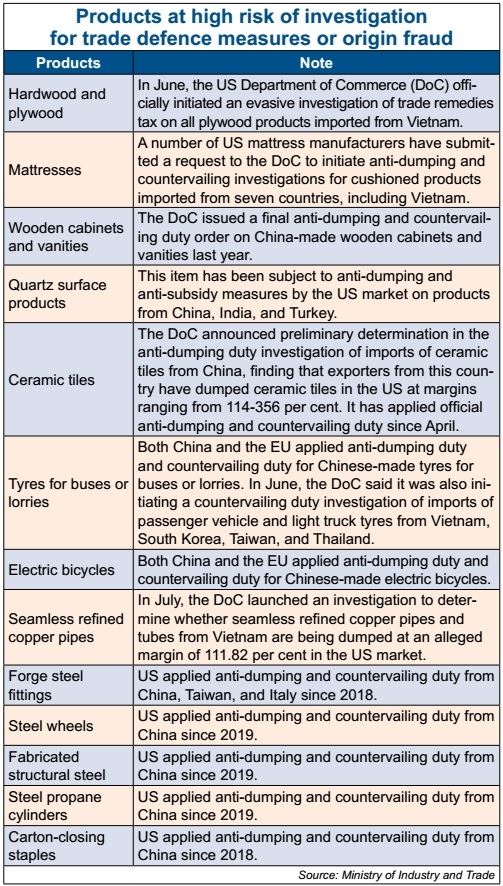EVFTA regulations throw up tricky goods origin hurdles
According the Ministry of Industry and Trade (MoIT), the European Union has investigated a total of 14 trade remedy cases against Vietnamese exports, while nearly 200 others have been initiated by other countries and territories.
Products under such investigation include leather, steel pipes, screws, bicycles, fibre, steel, forklifts, gas lighters, and some metals. Among that, the steel sector has witnessed a rise in anti-dumping lawsuits.
 |
The EU-Vietnam Free Trade Agreement (EVFTA), about to enter into force on August 1, will ensure trade between both sides will increase as the majority of import tariff lines are reduced to zero. However, the increase in bilateral import-export turnover may lead to the possibility of more trade defence cases involving the EU and Vietnam, according to the ministry.
The implementation of the EVFTA requires businesses to learn and understand commitments, including provisions on trade remedies so that they can prepare for and exploit new benefits.
The trade defence measure as used by the EU is an anti-dumping, anti-subsidy, or safeguard measure carried out to protect producers against unfairly-traded or subsidised imports, as well as against any major shifts in flows of trade, in so far as they are harmful to the economy of the bloc. The use of such trade defence instruments worldwide are generally based on rules set by the World Trade Organization.
The progressive principles are in line with the legal system of trade defence in Vietnam, creating tools to ensure effectiveness of their participation in the EVFTA.
This month, the MoIT expressed concern on the Philippines’ Department of Trade and Industry initiation of a safeguard investigation of Vietnamese products including galvanised steel, coated steel, and colour-coated steel sheets to this country. The department explained that given the import turnover of Vietnamese steel products to the Philippines accounting for a small proportion of total revenue, the products should be excluded from the safeguard measures. It suggested that the Vietnam Steel Association and local steelmakers should be active and carry out activities necessary to protect their legitimate rights.
Experts have said that a rising number of lawsuits are unavoidable as the Vietnamese economy integrates into regional and global economies, and some have warned that it could continue to increase protectionism, which in some areas has increased due to the ongoing pandemic.
Nguyen Cam Trang, deputy director of the Import and Export Department under the MoIT, said that the ministry has been taking early action to inform the business community of high-risk origin fraud. It released a list of 13 products which are at risk of being investigated for trade defence measures or origin fraud and illegal conveyance in the United States and EU, including tyres for buses and lorries, wood, mattresses, cabinets and vanities, and quartz surface products (see chart).
As one of the larger exporters of steel products to the US, Pham Manh Hung, general director of Nam Kim Steel JSC, said that his company is being active in completing documents and providing co-operation with relevant departments. “In order to avoid origin fraud, Nam Kim Steel has diversified its imported resources from India, South Korea, and Japan,” said Hung.
What the stars mean:
★ Poor ★ ★ Promising ★★★ Good ★★★★ Very good ★★★★★ Exceptional
Themes: EVFTA & EVIPA
Related Contents
Latest News
More News
- VNPAY and NAPAS deepen cooperation on digital payments (February 11, 2026 | 18:21)
- Vietnam financial markets on the rise amid tailwinds (February 11, 2026 | 11:41)
- New tax incentives to benefit startups and SMEs (February 09, 2026 | 17:27)
- VIFC launches aviation finance hub to tap regional market growth (February 06, 2026 | 13:27)
- Vietnam records solid FDI performance in January (February 05, 2026 | 17:11)
- Manufacturing growth remains solid in early 2026 (February 02, 2026 | 15:28)
- EU and Vietnam elevate relations to a comprehensive strategic partnership (January 29, 2026 | 15:22)
- Vietnam to lead trade growth in ASEAN (January 29, 2026 | 15:08)
- Japanese business outlook in Vietnam turns more optimistic (January 28, 2026 | 09:54)
- Foreign leaders extend congratulations to Party General Secretary To Lam (January 25, 2026 | 10:01)

 Tag:
Tag:




















 Mobile Version
Mobile Version